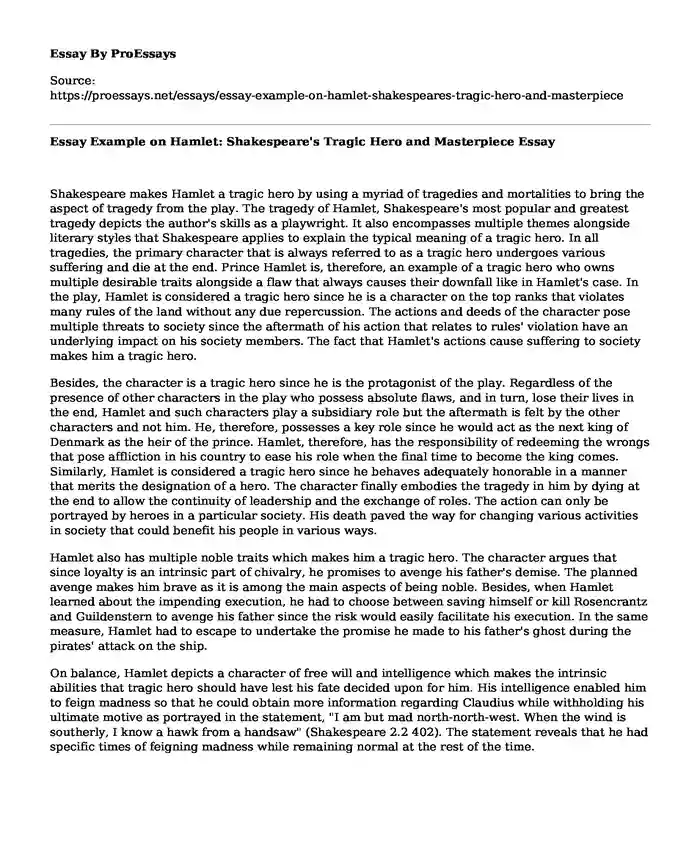Shakespeare makes Hamlet a tragic hero by using a myriad of tragedies and mortalities to bring the aspect of tragedy from the play. The tragedy of Hamlet, Shakespeare's most popular and greatest tragedy depicts the author's skills as a playwright. It also encompasses multiple themes alongside literary styles that Shakespeare applies to explain the typical meaning of a tragic hero. In all tragedies, the primary character that is always referred to as a tragic hero undergoes various suffering and die at the end. Prince Hamlet is, therefore, an example of a tragic hero who owns multiple desirable traits alongside a flaw that always causes their downfall like in Hamlet's case. In the play, Hamlet is considered a tragic hero since he is a character on the top ranks that violates many rules of the land without any due repercussion. The actions and deeds of the character pose multiple threats to society since the aftermath of his action that relates to rules' violation have an underlying impact on his society members. The fact that Hamlet's actions cause suffering to society makes him a tragic hero.
Besides, the character is a tragic hero since he is the protagonist of the play. Regardless of the presence of other characters in the play who possess absolute flaws, and in turn, lose their lives in the end, Hamlet and such characters play a subsidiary role but the aftermath is felt by the other characters and not him. He, therefore, possesses a key role since he would act as the next king of Denmark as the heir of the prince. Hamlet, therefore, has the responsibility of redeeming the wrongs that pose affliction in his country to ease his role when the final time to become the king comes. Similarly, Hamlet is considered a tragic hero since he behaves adequately honorable in a manner that merits the designation of a hero. The character finally embodies the tragedy in him by dying at the end to allow the continuity of leadership and the exchange of roles. The action can only be portrayed by heroes in a particular society. His death paved the way for changing various activities in society that could benefit his people in various ways.
Hamlet also has multiple noble traits which makes him a tragic hero. The character argues that since loyalty is an intrinsic part of chivalry, he promises to avenge his father's demise. The planned avenge makes him brave as it is among the main aspects of being noble. Besides, when Hamlet learned about the impending execution, he had to choose between saving himself or kill Rosencrantz and Guildenstern to avenge his father since the risk would easily facilitate his execution. In the same measure, Hamlet had to escape to undertake the promise he made to his father's ghost during the pirates' attack on the ship.
On balance, Hamlet depicts a character of free will and intelligence which makes the intrinsic abilities that tragic hero should have lest his fate decided upon for him. His intelligence enabled him to feign madness so that he could obtain more information regarding Claudius while withholding his ultimate motive as portrayed in the statement, "I am but mad north-north-west. When the wind is southerly, I know a hawk from a handsaw" (Shakespeare 2.2 402). The statement reveals that he had specific times of feigning madness while remaining normal at the rest of the time.
Work Cited
Shakespeare, William. The tragedy of Hamlet. University Press, 1904.
Cite this page
Essay Example on Hamlet: Shakespeare's Tragic Hero and Masterpiece. (2023, Apr 24). Retrieved from https://proessays.net/essays/essay-example-on-hamlet-shakespeares-tragic-hero-and-masterpiece
If you are the original author of this essay and no longer wish to have it published on the ProEssays website, please click below to request its removal:
- Uncertainty, Ambiguity and Irony in Shakespeare's Macbeth Essay
- I Felt a Funeral, in My Brain by Emily Dickinson - Literary Analysis Essay
- Self-Acceptance in Children With Synesthesia: The Girl Who Heard Colors Essay
- A Comparison of Flannery O'Connor's Good Country People and A Good Man Is Hard to Find
- Compare and Contrast Essay on Translation of the Opening Lines of the Odyssey
- Essay Example on Portraying Culture in Literature: Examining Homer's 'The Odyssey'
- Paper Example on Analysing Literary Devices in Ann Petry's Bones of Louella Brown







